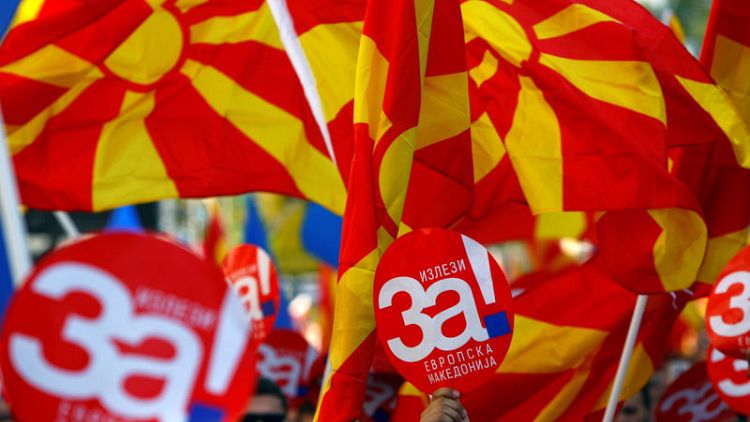By Kole Casule
SKOPJE (Reuters) - Fed up with Macedonia's economic woes, Solomon Bicakcic will vote "yes" in a referendum on Sunday on whether to change the country's name to qualify for European Union membership and - many hope - usher in prosperity.
"Something has to change, we cannot continue like this," Bicakcic, a 52-year-old pensioner, told Reuters.
Macedonia's bids for EU and NATO membership were blocked by Greece until June when it struck a deal with Athens on the name of the ex-Yugoslav republic to end a 27-year-long dispute.
Greece maintained that Macedonia's name implied territorial claims to its northern province of the same name.
Skopje must now formally adopt the name of Republic of North Macedonia, replacing Former Yugoslav Republic of Macedonia, to emerge from decades of stagnation and instability.
To secure popular support for the required constitutional amendments, Prime Minister Zoran Zaev's government called a referendum with one question - are you for or against EU and NATO membership through implementation of the name deal.
"NATO membership would bring stability and security, which is very important for investment," Zaev told Reuters after a referendum "yes" rally in the southern town of Demir Kapija.
He said he expected parliament to adopt the constitutional changes, enabling the small landlocked Balkan republic to join NATO next spring, once Greece's parliament ratifies the pact.
A recent poll by Macedonia's Telma TV found 57 percent of respondents planning to vote on Sunday. Of those, 70 percent said they would vote yes.
But whether turnout does exceed the minimum 50 percent for the referendum to be valid is uncertain given a boycott campaign backed by nationalists opposed to the name change, including a group linked to Russia's ruling party.
"Russia is openly saying it is against Macedonian membership in NATO and the EU, and we understand the position of Russia, but all our friends should know there is no alternative for us," Zaev, a Social Democrat, said.
Macedonia's economy stalled last year on the back of a two-year financial crisis with unemployment exceeding 20 percent, one of the highest rates in the Balkans, and an average monthly net salary of 350 euros (312 pounds), the lowest in the region.
"This isn’t living, this is surviving," Bicakcic said.
Western diplomats regard integration of the Western Balkan countries into NATO and the EU as the best way to stabilise and develop a region still suffering instability lingering from the 1990s wars triggered by Yugoslavia's break-up.
BOYCOTT CAMPAIGN
Although a vast majority of Macedonians support NATO and EU membership, many may be reluctant to vote on Sunday because of objections - common among nationalists and conservatives - to changing the country's name.
The boycott campaign has made effective use of social media - Facebook and Twitter - and spread "fake news", critics say.
The Transatlantic Commission on Election Integrity said on Wednesday it had uncovered evidence that automated Twitter accounts had swung "behind an effort to suppress voter turnout".
"New accounts (created less than 60 days ago) make up 10 percent of the conversation – a figure higher than in the recent Mexican and almost three times higher than in the Italian elections," it said in an emailed statement to Reuters.
One of the main pro-boycott opposition parties is United Macedonia, which has ties with the United Russia party of Russian President Vladimir Putin.
"It is interesting how much all fake news pages reflect stances similar to Russia Today and other Russian (media) outlets," said Florian Bieber of Austria's Graz University.
U.S. Defence Secretary James Mattis has accused Russia of meddling in the referendum by trying to suppress turnout.
Last week Russian Foreign Minister Sergei Lavrov denied that Moscow had done anything "which could be interpreted as favouring a particular vote ... We do not say anything."
Macedonia's main opposition, nationalist VMRO-DPMNE party strongly opposed the name change deal. It has not taken a position on the referendum, instead urging faithful to vote or boycott it according to their conscience.
Even if a referendum "yes" emerges, that may not settle the matter - ratification by Greece is no sure thing given divisions in the ruling-left right coalition. A right-wing party in the bloc vows to vote "no" when the matter comes before parliament early next year, defying Prime Minister Alexis Tsipras.
(Additional reporting by Fedja Grulovic in Skopje and Michele Kambas in Athens; Writing by Ivana Sekularac; Editing by Mark Heinrich)
